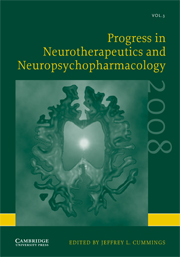Book contents
- Frontmatter
- Contents
- Contributors
- Progress in Neurotherapeutics and Neuropsychopharmacology 2008
- Triflusal versus Aspirin for the Prevention of Stroke
- The Argatroban and tPA Stroke Study
- Use of Selegiline as Monotherapy and in Combination with Levodopa in the Management of Parkinson's Disease: Perspectives from the MONOCOMB Study
- Ropinirole 24-h Prolonged Release in Advanced Parkinson Disease: Review of a Randomized, Double-Blind, Placebo-Controlled Study (EASE PD-Adjunct Study)
- Insulin Resistance Alzheimer's Disease: Pathophysiology and Treatment
- Targeting Amyloid with Tramiprosate in Patients with Mild-to-Moderate Alzheimer Disease
- Intranasal Zolmitriptan Is Effective and Well Tolerated in Acute Cluster Headache: A Randomized Placebo-Controlled Double-Blind Crossover Study
- Optimal Dosing of Immunomodulating Drugs: A Dose-Comparison Study of GA in RRMS
- Tetrathiomolybdate versus Trientine in the Initial Treatment of Neurologic Wilson's Disease
- Randomized Clinical Trials of Pregabalin for Neuropathic Pain: Methods, Results, and Implications
- Effect of Methylphenidate in Patients with Acute Traumatic Brain Injury; a Randomized Clinical Trial
- Improvement in Speeded Cognitive Processing After Anti-epileptic Drug Withdrawal–A Controlled Study in Mono-therapy Patients
- A Randomized-Controlled Trial of Bilateral rTMS for Treatment-Resistant Depression
- Serotonin Related Genes Affect Antidepressant Treatment in Obsessive–Compulsive Disorder
- Night Eating Syndrome and Results from the First Placebo-Controlled Trial of Treatment, with the SSRI Medication, Sertraline: Implications for Clinical Practice
- Modafinil: A Candidate for Pharmacotherapy of Negative Symptoms in Schizophrenia
- New Approaches to Treatment of Schizophrenia by Enhancing N-methyl-D-aspartate Neurotransmission
- Subject Index
- Author Index
Targeting Amyloid with Tramiprosate in Patients with Mild-to-Moderate Alzheimer Disease
Published online by Cambridge University Press: 13 May 2010
- Frontmatter
- Contents
- Contributors
- Progress in Neurotherapeutics and Neuropsychopharmacology 2008
- Triflusal versus Aspirin for the Prevention of Stroke
- The Argatroban and tPA Stroke Study
- Use of Selegiline as Monotherapy and in Combination with Levodopa in the Management of Parkinson's Disease: Perspectives from the MONOCOMB Study
- Ropinirole 24-h Prolonged Release in Advanced Parkinson Disease: Review of a Randomized, Double-Blind, Placebo-Controlled Study (EASE PD-Adjunct Study)
- Insulin Resistance Alzheimer's Disease: Pathophysiology and Treatment
- Targeting Amyloid with Tramiprosate in Patients with Mild-to-Moderate Alzheimer Disease
- Intranasal Zolmitriptan Is Effective and Well Tolerated in Acute Cluster Headache: A Randomized Placebo-Controlled Double-Blind Crossover Study
- Optimal Dosing of Immunomodulating Drugs: A Dose-Comparison Study of GA in RRMS
- Tetrathiomolybdate versus Trientine in the Initial Treatment of Neurologic Wilson's Disease
- Randomized Clinical Trials of Pregabalin for Neuropathic Pain: Methods, Results, and Implications
- Effect of Methylphenidate in Patients with Acute Traumatic Brain Injury; a Randomized Clinical Trial
- Improvement in Speeded Cognitive Processing After Anti-epileptic Drug Withdrawal–A Controlled Study in Mono-therapy Patients
- A Randomized-Controlled Trial of Bilateral rTMS for Treatment-Resistant Depression
- Serotonin Related Genes Affect Antidepressant Treatment in Obsessive–Compulsive Disorder
- Night Eating Syndrome and Results from the First Placebo-Controlled Trial of Treatment, with the SSRI Medication, Sertraline: Implications for Clinical Practice
- Modafinil: A Candidate for Pharmacotherapy of Negative Symptoms in Schizophrenia
- New Approaches to Treatment of Schizophrenia by Enhancing N-methyl-D-aspartate Neurotransmission
- Subject Index
- Author Index
Summary
ABSTRACT
Background: Tramiprosate (3-amino-1-propanesulfonic acid, 3APS, ALZHEMED™) is an investigational product candidate that is believed to reduce amyloid deposition in the brain by binding to soluble Aβ, thereby slowing or halting the progression of Alzheimer Disease (AD). Design and Methods: We assessed the safety, tolerability, and pharmacokinetic/pharmacodynamic profiles of tramiprosate in a randomized, double-blind, placebo-controlled Phase II study in which 58 subjects with mild-to-moderate AD were randomly assigned to receive placebo or tramiprosate 50, 100, or 150mg BID for 3 months. At the end of the double-blind study, 42 of these patients entered an open-label extension study in which they received tramiprosate 150mg BID for an additional 17 months. Assessments included plasma and CSF tramiprosate concentrations, CSF Aβ42 concentrations, and psychometric tests (Alzheimer's Disease Assessment Scale–cognitive subscale, Mini-Mental State Examination, and Clinical Dementia Rating Scale–Sum of Boxes). Results: Tramiprosate had no significant impact on vital signs or laboratory test values. The most frequent side effects were nausea, vomiting, and diarrhea, which were intermittent and mild-to-moderate in severity. Overall, six tramiprosate-treated patients discontinued because of side effects (all causalities) and there were no drug-related serious adverse events. Tramiprosate crossed the blood–brain barrier and dose-dependently reduced CSF Aβ42 levels after 3 months of treatment. There were no psychometric score differences between treatment groups after 3 months of double-blind treatment. However, psychometric score changes over the 17-month open-label extension study are consistent with a slowing of cognitive and clinical decline, particularly in mild subjects.
- Type
- Chapter
- Information
- Progress in Neurotherapeutics and Neuropsychopharmacology , pp. 111 - 126Publisher: Cambridge University PressPrint publication year: 2008

